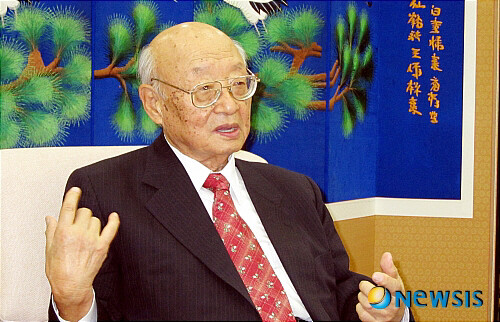hankyoreh
Links to other country sites 다른 나라 사이트 링크
For composer Jung Choo, love of country despite 65 years of exile

By Ahn Kwan-ok, Gwangju Correspondent
Jung Choo, a 86-year-old renowned composer recently visited his hometown of Gwangju after 65 years of living overseas with an invitation from Gwangju Cultural Foundation. Jung is a former professor at Almaty National University in Russia who went into exile for his opposition to Kim Il-sung’s personality cult. His famous compositions include “A Song of the Raft” that was presented by Soviet officials to celebrate the historic first manned spaceship mission. More than 60 of Jung’s compositions are now included in Kazakhstan school textbooks. His name recognition, however, has faded in South Korea not because of his work, but because of his perceived political stance. Jung had been both viewed as a disgraced defector to communist North Korea by Seoul and an anti-Kim Il-sung dissident by Pyongyang.
Upon his graduation from University in Japan with a degree in musical composition, he took a position as a Pyongyang College of Music professor and later studied abroad in the Soviet Union. His life took a drastic turn when he organized rallies in Moscow in 1957, criticizing the Pyongyang’s newly-initiated efforts to build a personality cult around its leader Kim Il-sung. A year later, he was sent into exile to Almaty in Kazakhstan and spent the first 17 years as a person with no citizenship. From 1974 to 1990 he was registered as a Soviet Union citizen. He has been a Kazakhstan citizen since 1990.
Jung’s works have always centered around his unconditional love of country despite the hatred held by the two governments in North Korea and South Korea toward him. His patriotism began in his high school years, during which at one point he was expelled from the school for insisting on speaking Korean, which was banned from being spoken in public institutions nationwide during the latter years of the 36-year Japanese colonial rule.
With his symphony “Motherland,” which employs a traditional pentatonic scale, Jung graduated from The Tchaikovsky National Academy of Music summa cum laude. He also worked to compose a piece titled “1937, September 11” to describe the sufferings of Koreans from forced mobilization that deported them from Yunhaju to barren lands of Central Asia in the 1930’s. He also devoted to collecting and preserving Korean folk music pieces. He received his Ph.D. degree from Leningrad College of Music and based on the collection of 1068 traditional folk songs over the period of twenty years.
During the visit, Jung gave special lectures at the Asia Cultural Forum and alma mater high school and visited the gravesites of his parents in the southwestern city of Gwangju.
“I have spent the last 65 years living overseas without a true home because of the tragic division of the two Koreas. My last wish is to be buried under the soils of a unified Korea,” said the composer of his last hope for his beloved country.
(Translated by Kang Jin-kyu, Intern)
Please direct questions or comments to [englishhani@hani.co.kr]
Editorial・opinion
![[Column] Season 2 of special prosecutor probe may be coming to Korea soon [Column] Season 2 of special prosecutor probe may be coming to Korea soon](https://flexible.img.hani.co.kr/flexible/normal/500/300/imgdb/original/2024/0426/3317141030699447.jpg) [Column] Season 2 of special prosecutor probe may be coming to Korea soon
[Column] Season 2 of special prosecutor probe may be coming to Korea soon![[Column] Park Geun-hye déjà vu in Yoon Suk-yeol [Column] Park Geun-hye déjà vu in Yoon Suk-yeol](https://flexible.img.hani.co.kr/flexible/normal/500/300/imgdb/original/2024/0424/651713945113788.jpg) [Column] Park Geun-hye déjà vu in Yoon Suk-yeol
[Column] Park Geun-hye déjà vu in Yoon Suk-yeol- [Editorial] New weight of N. Korea’s nuclear threats makes dialogue all the more urgent
- [Guest essay] The real reason Korea’s new right wants to dub Rhee a founding father
- [Column] ‘Choson’: Is it time we start referring to N. Korea in its own terms?
- [Editorial] Japan’s rewriting of history with Korea has gone too far
- [Column] The president’s questionable capacity for dialogue
- [Column] Are chaebol firms just pizza pies for families to divvy up as they please?
- [Column] Has Korea, too, crossed the Rubicon on China?
- [Correspondent’s column] In Japan’s alliance with US, echoes of its past alliances with UK
Most viewed articles
- 1‘We must say no’: Seoul defense chief on Korean, USFK involvement in hypothetical Taiwan crisis
- 2After election rout, Yoon’s left with 3 choices for dealing with the opposition
- 3AI is catching up with humans at a ‘shocking’ rate
- 4Why Kim Jong-un is scrapping the term ‘Day of the Sun’ and toning down fanfare for predecessors
- 5[Editorial] Korea’s surprise Q1 growth requires objective assessment, not blind fanfare
- 6Noting shared ‘values,’ Korea hints at passport-free travel with Japan
- 7Two factors that’ll decide if Korea’s economy keeps on its upward trend
- 8Gangnam murderer says he killed “because women have always ignored me”
- 9The dream K-drama boyfriend stealing hearts and screens in Japan
- 10Yoon says collective action by doctors ‘shakes foundations of liberty and rule of law’